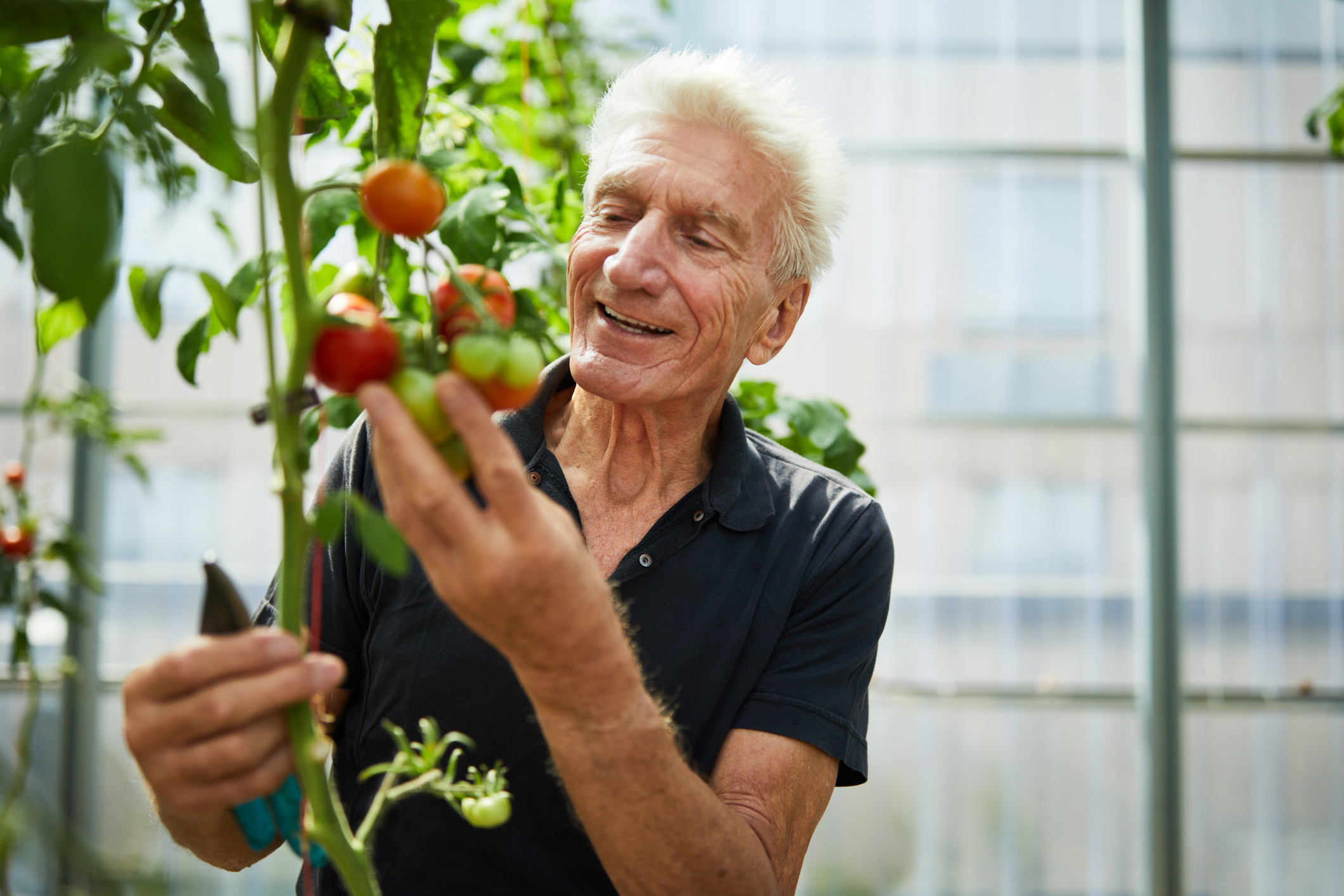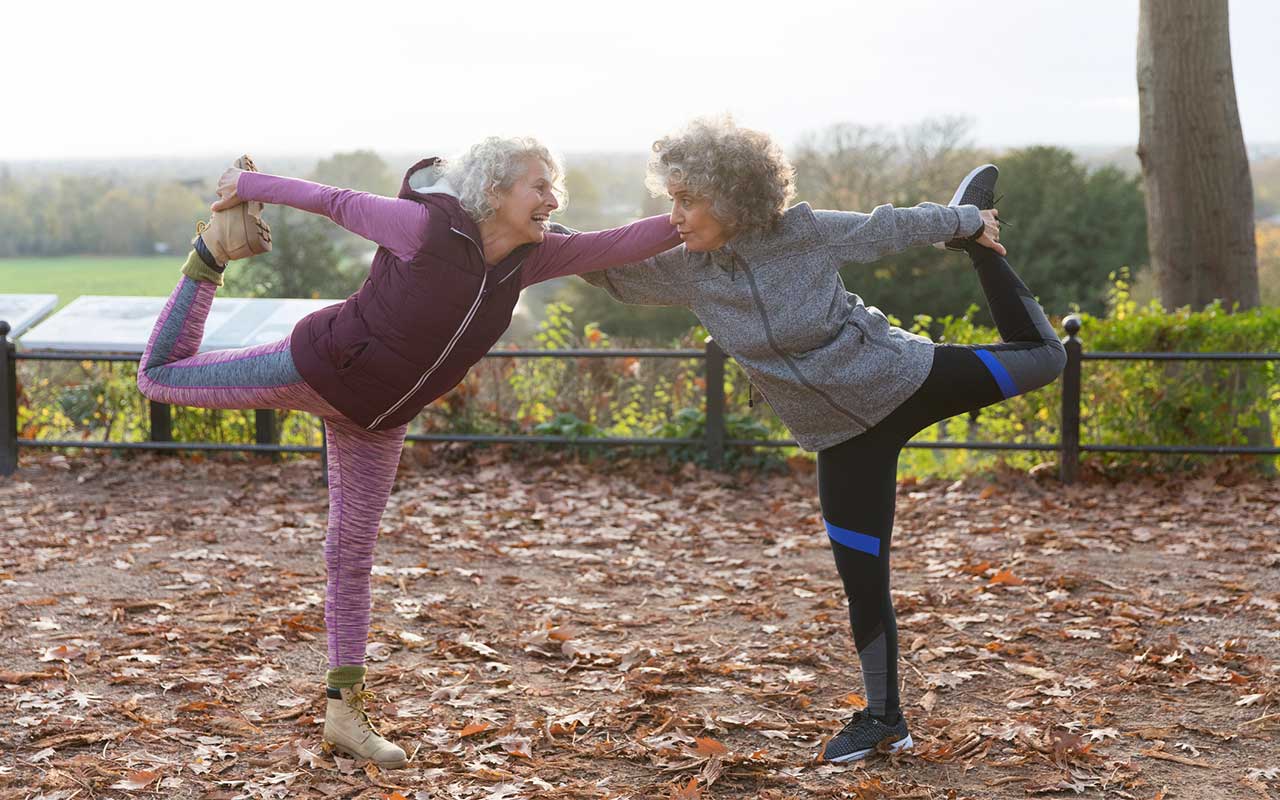6 Super-Agers' Secrets to Keeping Your Brain Sharp
Exercise, healthy eating and maintaining friendships help some seniors keep their cognitive abilities sharp.


If you’re reading this while pedaling a stationary bike, sipping a blueberry smoothie and chatting with your gym buddies, congratulations: You just might become a “super ager.”
Super agers are seniors who have cognitive abilities comparable to people decades younger. And a growing body of research suggests that we can all boost our odds of joining their ranks by tweaking our daily habits and rethinking our views on aging.
Physical exercise, intellectual challenges, strong friendships and a healthy diet can all help protect an aging brain, studies show. But it’s not just about crossword puzzles and leafy greens. Read on to discover the secrets of the super agers.

Have a Positive Mindset
Do you view the aging process as fixed and inevitable, or do you believe that everyone ages differently—and that your own aging process could be quite positive? Those who view aging as fixed tend to perform poorly on memory tests when confronted with negative age stereotypes, while those with more flexible views perform better, according to David Weiss of the University of Leipzig, whose research focuses on psychology and aging.
Negative age stereotypes are “all around us,” Weiss says. But “there’s no homogeneous aging trajectory. It’s so different from person to person.” In his research, people who subscribe to that more malleable view of aging “put more effort into the task to show that they don’t conform” to the stereotypes, he says.
It’s important to “become aware of the power of our attitudes and beliefs,” Weiss says. “Our mindsets have a strong impact on how we are aging.”

Make Friends
Strong friendships may be key to protecting the brain in later life. Studies show that “there are a lot of negative consequences to loneliness and positive consequences of staying socially active and engaged,” says Emily Rogalski, associate professor at Northwestern University’s Feinberg School of Medicine.
That doesn’t mean lifelong introverts need to become social butterflies. The positive effects of staying engaged could come through a large group of friends or just a single close relationship, Rogalski says. “Different neurotransmitters are released when we feel compassion, empathy, love and friendship,” she says. Chronic stress, on the other hand, can negatively affect parts of the brain important for memory. Simply calling up a friend, she says, may be good for your brain.

Stay in Shape
Physical exercise is also critical to brain health as you age. “There are new synapses, or connections between neurons, that happen as a result of exercise,” says Art Kramer, professor of neuroscience and psychology at Northeastern University. People who do more aerobic exercise, such as walking and biking, tend to have better memory and problem-solving skills and lower rates of dementia, he says.
In one study, Kramer and his colleagues found that aerobic walkers tended to increase the volume of their hippocampus—an area of the brain associated with memory—while people doing only toning and stretching exercises experienced normal age-related declines in hippocampus volume.
For many people, of course, the hardest part of exercise is getting started. “You can’t tell somebody who has been a professional couch potato to start doing triathlons,” Kramer acknowledges. His advice: Start with something you enjoy. “You can walk, ride your bike, go to a gym, play a sport,” he says. “Just do something, and lots of positive things can happen.”

Train Your Brain
The brain needs exercise, too. And the vast selection of “brain games” on the market suggests that seniors have bought in to that concept in a big way. But there’s no magic in any particular intellectual exercise, Rogalski says. The key is finding something that interests and challenges you.
“If you hate crossword puzzles and they create angst, I’d suggest not doing them,” Rogalski says. Choose something that’s new, enjoyable and stimulating to you, she advises—“the sky’s the limit.” Perhaps you could take a photography course or learn to play an instrument. “Our brain likes to be challenged, and that’s what helps strengthen connections between brain cells,” she says.

Eat Well
You knew this was coming: Stick to a healthy diet. The MIND diet, developed by researchers at Rush University Medical Center and Harvard University, may reduce the risk of Alzheimer’s disease, research shows.
The MIND diet is “like the Mediterranean diet, but on steroids,” Kramer says. It focuses on 10 “brain-healthy” food groups, including vegetables, whole grains, nuts, beans, poultry, berries, olive oil and fish. And it limits butter, sweets and pastries, red meat, whole-fat cheese and fried or fast food.
For more information, search “MIND diet” at rush.edu, or read Diet for the MIND by Rush University nutritional epidemiologist Martha Clare Morris (Little, Brown & Co., $28.)

Focus on Factors You Can Control
Let’s face it: Some factors that may contribute to brain health in our later years are beyond our control. Researchers at Northwestern University, for example, have found that super agers often have a large number of “von Economo” neurons—a special type of brain cell. The role of these neurons is not yet clear, Rogalski says.
We also can’t control all of life’s sucker punches—the serious illnesses, job losses, deaths of loved ones, and other challenges. But we can strive to be resilient—and that’s a common trait of super agers, Rogalski says. “These individuals didn’t necessarily have easy lives. They’ve had traumatic experiences,” she says. But they “tend to do a very good job of finding the silver lining.”
Profit and prosper with the best of Kiplinger's advice on investing, taxes, retirement, personal finance and much more. Delivered daily. Enter your email in the box and click Sign Me Up.

-
 Cord Cutting Could Help You Save Over $10,000 in 10 Years
Cord Cutting Could Help You Save Over $10,000 in 10 YearsHow cutting the cord can save you money and how those savings can grow over time.
-
 The '8-Year Rule of Social Security' — A Retirement Rule
The '8-Year Rule of Social Security' — A Retirement RuleThe '8-Year Rule of Social Security' holds that it's best to be like Ike — Eisenhower, that is. The five-star General knew a thing or two about good timing.
-
 What to Do With Your Tax Refund: 6 Ways to Bring Growth
What to Do With Your Tax Refund: 6 Ways to Bring GrowthUse your 2024 tax refund to boost short-term or long-term financial goals by putting it in one of these six places.
-
 What Does Medicare Not Cover? Eight Things You Should Know
What Does Medicare Not Cover? Eight Things You Should KnowHealthy Living on a Budget Medicare Part A and Part B leave gaps in your healthcare coverage. But Medicare Advantage has problems, too.
-
 12 Great Places to Retire in the Midwest
12 Great Places to Retire in the MidwestPlaces to live Here are our retirement picks in the 12 midwestern states.
-
 10 Cheapest Small Towns to Live In
10 Cheapest Small Towns to Live InThe cheapest small towns might not be for everyone, but their charms can make them the best places to live for plenty of folks.
-
 15 Reasons You'll Regret an RV in Retirement
15 Reasons You'll Regret an RV in RetirementMaking Your Money Last Here's why you might regret an RV in retirement. RV-savvy retirees talk about the downsides of spending retirement in a motorhome, travel trailer, fifth wheel, or other recreational vehicle.
-
 The 24 Cheapest Places To Retire in the US
The 24 Cheapest Places To Retire in the USWhen you're trying to balance a fixed income with an enjoyable retirement, cost of living is a crucial factor to consider.
-
 The Six Best Places to Retire in New England
The Six Best Places to Retire in New Englandplaces to live Thinking about a move to New England for retirement? Here are the best places to land for quality of life, affordability and other criteria.
-
 Estate Planning Checklist: 13 Smart Moves
Estate Planning Checklist: 13 Smart Movesretirement Follow this estate planning checklist for you (and your heirs) to hold on to more of your hard-earned money.
